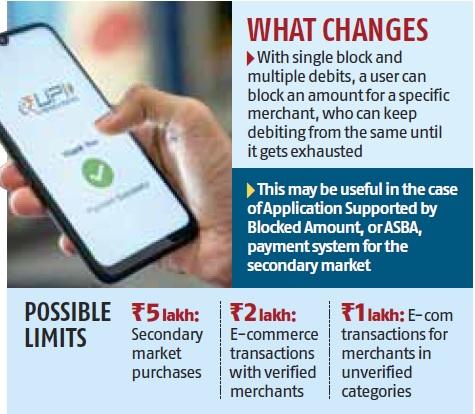UPI to now allow blocking money for multiple debits, paves way for ASBA
The Reserve Bank of India (RBI) on Wednesday enhanced the capabilities of the Unified Payments Interface (UPI) by introducing a ‘single-block-and-multiple debits’ functionality, which allows a customer to enable a payment mandate against a merchant by blocking funds for specific purposes in his/her bank account which can be debited, whenever needed.
Also, the RBI said the Bharat Bill Payment System (BBPS) will now include a wider variety of recurring and non-recurring payments.
The single-block-and-multiple debits feature is expected to have multiple use cases in various segments, such as e-commerce transactions, investment in the secondary market and purchase of government securities using the RBI’s Retail Direct scheme. The RBI will issue instructions to the National Payments Corporation of India (NPCI), which runs and manages UPI, on this functionality shortly.
This new functionality will play a key role in building the framework for blocking money for secondary market trades, a mechanism called Application Supported by Blocked Amount (ASBA), which the capital market regulator is planning to implement.
With the single-block-and-multiple debits capability, a customer will be able to block an amount for a specific merchant, who can keep debiting from the same blocked amount until it gets exhausted.
“When it comes to e-commerce, there is a prepaid model and there is a postpaid model, which is cash on delivery. Now, with this feature on UPI, another mode of payment has been introduced. A customer can give a mandate to an e-commerce merchant whereby a certain amount will be blocked for buying goods and once the goods get delivered, the money will be debited,” a source aware of the development said.
Similarly, this is also expected to be useful in the Securities and Exchange Board of India’s (Sebi’s) idea of developing an ASBA payment system for the secondary market, whereby T+1 settlement would get a boost.
The limits being explored are Rs 5 lakh for secondary market purchases, Rs 2 lakh for e-commerce transactions with verified merchants, and Rs 1 lakh for merchants in unverified categories, the source quoted above said.
According to experts, this feature will provide a boost to the already burgeoning payment volumes of UPI. Currently, UPI enables mandates for recurring transactions and single-block-and-single-debit functionality. Consequently, over 7 million autopay mandates are handled every month and more than half of IPO applications are processed using the block feature of UPI.
According to the RBI, this feature will build a higher degree of trust in transactions as merchants will be assured of timely payments, while the funds remain in the customer’s account until delivery of goods or services.
“Allowing this feature would further boost the economy as people who were usually using cash or UPI for transactions will use it further for their investment or travel or hotel booking needs,” said Vihswas Patel, chairman, Payments Council of India.
“The single-block-and-multiple debits feature allows users and merchants to decide on a certain limit to which a credit card may be authorised, making it convenient for customers and giving confidence to merchants. Now that UPI is capable of similar services, it is poised to increase its reach considerably making it the most popular mode of payment in the near future, in line with the RBI’s vision,” said Krishnan Vishwanathan, founder & executive director, RING.
Avinash Godkhindi, MD & CEO, Zaggle, said: “This will significantly enhance the ease of making payments in the e-commerce space.”
UPI has emerged as one of the most popular and preferred payment modes in the country. According to the latest data, UPI processed 7.30 billion transactions in November, amounting to Rs 11.90 trillion. Volume and value of UPI transactions have continued to be on an upward trajectory in the past two years, mirroring the recovery in the broader economy and the increased adoption of consumers to use digital modes of payments for their daily transactions.
In FY23 so far, UPI has processed 51.62 billion transactions, amounting to Rs 87 trillion. In FY22, UPI processed more than 46 billion transactions worth over Rs 84.17 trillion.
Meanwhile, the RBI has decided to expand the scope of BBPS, which earlier was restricted to recurring payment categories, to include all categories of payments and collections, both recurring and non-recurring.
“This will make the platform accessible to a wider set of individuals and businesses who can benefit from the transparent and uniform payments experience, faster access to funds and improved efficiency,” the RBI said.
Experts have coined this a game-changing moment for BBPS as some categories of payments/collections that remain outside the ambit of the BBPS viz., professional service fee payments, education fees, tax payments, rent collections, etc., will now get included and there can be a sharp rise in the volume of transactions that the platform is seeing.
“…expanding the scope of BBPS to include all categories of payments and collections, both recurring and non-recurring in nature is a masterstroke to broad base and universalise its acceptance,” said Soumya Kanti Ghosh, Group Chief Economic Adviser, State Bank of India (SBI).

 Loan, Personal Loan, Home Loan, Business Loan,Loans in India Loan in India, Personal Loan, Home Loan, Business Loan, Loans in India,Loan Finance,Loan in India, Get Instant Personal Loan,Home Loan, Business Loans in India
Loan, Personal Loan, Home Loan, Business Loan,Loans in India Loan in India, Personal Loan, Home Loan, Business Loan, Loans in India,Loan Finance,Loan in India, Get Instant Personal Loan,Home Loan, Business Loans in India